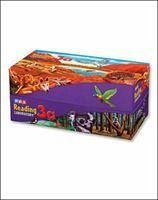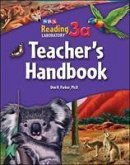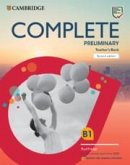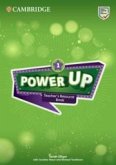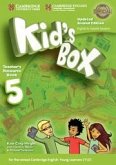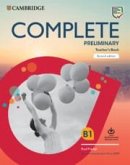Don Parker
Reading Lab 3a, Complete Kit, Levels 3.5 - 11.0
Don Parker
Reading Lab 3a, Complete Kit, Levels 3.5 - 11.0
- Gebundenes Buch
- Merkliste
- Auf die Merkliste
- Bewerten Bewerten
- Teilen
- Produkt teilen
- Produkterinnerung
- Produkterinnerung
A kit that includes: Power Builders (110), Rate Builders (110), and Skills Builders (225) with coordinating Answer Key cards. It also includes: Student Record Book; Teacher's Handbook; and,Program Management/Assessment CD-ROM.
Andere Kunden interessierten sich auch für
![Reading Lab 3a, Teacher's Handbook, Levels 3.5 - 11.0' Reading Lab 3a, Teacher's Handbook, Levels 3.5 - 11.0']() Don H ParkerReading Lab 3a, Teacher's Handbook, Levels 3.5 - 11.0'78,99 €
Don H ParkerReading Lab 3a, Teacher's Handbook, Levels 3.5 - 11.0'78,99 €![Complete Preliminary Teacher's Book English for Spanish Speakers Complete Preliminary Teacher's Book English for Spanish Speakers]() Rod FrickerComplete Preliminary Teacher's Book English for Spanish Speakers56,99 €
Rod FrickerComplete Preliminary Teacher's Book English for Spanish Speakers56,99 €![Complete First for Schools Teacher's Book with Downloadable Resource Pack (Class Audio and Teacher's Photocopiable Worksheets) Complete First for Schools Teacher's Book with Downloadable Resource Pack (Class Audio and Teacher's Photocopiable Worksheets)]() Alice CopelloComplete First for Schools Teacher's Book with Downloadable Resource Pack (Class Audio and Teacher's Photocopiable Worksheets)189,99 €
Alice CopelloComplete First for Schools Teacher's Book with Downloadable Resource Pack (Class Audio and Teacher's Photocopiable Worksheets)189,99 €![Power Up Level 1 Teacher's Resource Book with Online Audio Power Up Level 1 Teacher's Resource Book with Online Audio]() Sarah DilgerPower Up Level 1 Teacher's Resource Book with Online Audio68,99 €
Sarah DilgerPower Up Level 1 Teacher's Resource Book with Online Audio68,99 €![Kid's Box Level 5 Teacher's Resource Book with Audio CDs (2) Updated English for Spanish Speakers Kid's Box Level 5 Teacher's Resource Book with Audio CDs (2) Updated English for Spanish Speakers]() Kate Cory-WrightKid's Box Level 5 Teacher's Resource Book with Audio CDs (2) Updated English for Spanish Speakers68,99 €
Kate Cory-WrightKid's Box Level 5 Teacher's Resource Book with Audio CDs (2) Updated English for Spanish Speakers68,99 €![Evolve Level 1 Teacher's Edition with Test Generator Evolve Level 1 Teacher's Edition with Test Generator]() Chris SpeckEvolve Level 1 Teacher's Edition with Test Generator189,99 €
Chris SpeckEvolve Level 1 Teacher's Edition with Test Generator189,99 €![Complete Preliminary Teacher's Book with Downloadable Resource Pack (Class Audio and Teacher's Photocopiable Worksheets) Complete Preliminary Teacher's Book with Downloadable Resource Pack (Class Audio and Teacher's Photocopiable Worksheets)]() Rod FrickerComplete Preliminary Teacher's Book with Downloadable Resource Pack (Class Audio and Teacher's Photocopiable Worksheets)141,99 €
Rod FrickerComplete Preliminary Teacher's Book with Downloadable Resource Pack (Class Audio and Teacher's Photocopiable Worksheets)141,99 €-
-
-
A kit that includes: Power Builders (110), Rate Builders (110), and Skills Builders (225) with coordinating Answer Key cards. It also includes: Student Record Book; Teacher's Handbook; and,Program Management/Assessment CD-ROM.
Hinweis: Dieser Artikel kann nur an eine deutsche Lieferadresse ausgeliefert werden.
Hinweis: Dieser Artikel kann nur an eine deutsche Lieferadresse ausgeliefert werden.
Produktdetails
- Produktdetails
- READING LABS
- Verlag: McGraw-Hill Education - Europe
- 3 ed
- Erscheinungstermin: 16. September 2005
- Englisch
- Abmessung: 263mm x 608mm x 292mm
- Gewicht: 9476g
- ISBN-13: 9780076042692
- ISBN-10: 0076042693
- Artikelnr.: 54756626
- Herstellerkennzeichnung
- Libri GmbH
- Europaallee 1
- 36244 Bad Hersfeld
- gpsr@libri.de
- READING LABS
- Verlag: McGraw-Hill Education - Europe
- 3 ed
- Erscheinungstermin: 16. September 2005
- Englisch
- Abmessung: 263mm x 608mm x 292mm
- Gewicht: 9476g
- ISBN-13: 9780076042692
- ISBN-10: 0076042693
- Artikelnr.: 54756626
- Herstellerkennzeichnung
- Libri GmbH
- Europaallee 1
- 36244 Bad Hersfeld
- gpsr@libri.de
SRA salutes Dr. Don Parker, whose remarkable insight, creativity, energy, and concern have helped educators meet the individual learning needs of millions of children over the past 40 years. Parker published his first SRA Reading Lab in February 1957. The labs answered the question of how to provide individualized, multilevel learning for students. The story of the man with an idea and a box begins in 1950. While studying for his master's degree in psychology, Parker took a teaching position in a rural Florida school district. He says the superintendent wanted someone "to help our children read better." Although Parker didn't have classroom experience, he had taken psychology and education courses that he says gave him "ideas about individual differences among learners." Soon these ideas were energized as he tested 3,000 students at ten schools. Eventually, he focused on a class of 32 seventh-grade students with reading levels varying from second grade to twelfth grade. Parker wanted to help these students learn to read at a pace and level that was appropriate for their varied abilities. He began selecting and cutting out lessons from reading workbooks, sorting them by reading level, and putting them into folders. To avoid embarrassing any students, he didn't designate the folder levels by grade numbers; instead, he colored a band around the edge of each folder. He created keys so the students could check their own work and eventually move to the next color level. There were ten color-coded levels. Finally, Parker consolidated all the folders and keys in an old tomato box. This old box of folders and key cards became the earliest form of the Reading Lab. Over the next five years, Parker successfully opened a reading lab at the University of North Carolina and began work on a doctoral degree at Columbia University. Repeatedly encouraged to market his reading lab, Parker took his box (now a cardboard box painted blue) to Science Research Associates. A publisher of psychological, achievement, and vocational guidance tests, SRA wanted to branch out into learning materials. SRA was looking for new ideas. Parker's individualized, multilevel lab format-as opposed to textbooks-was a new concept for the classroom. He presented his innovative program to SRA, and the publisher grasped the potential of this unique learning tool. February 1957 was the publishing date for the SRA Reading Labs! Shortly after the first Labs debuted, Parker received his doctoral degree from Columbia University. Parker eventually became SRA's "scientist in residence." Over the years, other distinguished authors joined Parker in writing updated versions of the Reading Lab, elementary school versions, and supporting materials. Parker traveled extensively, teaching children the world over how to use his multilevel box, SRA Reading Labs. Over the past 40 years, multilevel teaching-learning systems developed by Parker in reading, spelling, vocabulary, literature, and elementary science have been used by more than 100,000,000 pupils in the U.S. and 62 other countries. The SRA Reading Labs continue to be updated, modernized, and, as always, multilevel. SRA congratulates Dr. Don Parker on his lifetime of achievement in helping children all over the world learn to read by using the SRA Reading Labs.

